Taking on Arthritis Together
Versus Arthritis and Our Health Research Team have partnered to form an exciting new community-based participatory research project that aims to improve the lives of people living with the disease.
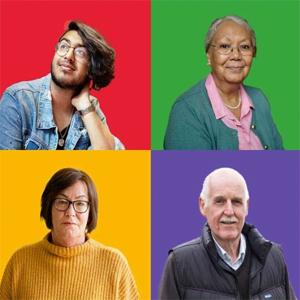
In early 2021, medical researchers and undergraduate students from the University of Edinburgh partnered with Versus Arthritis research volunteers, to form a collaborative research team that aimed to create new research questions about Arthritis. Answering these questions would help to improve the lives of people living with the disease.
The newly formed research team, decided to use a research approach known as Community-based Participatory Research, to understand the lived experiences of people who have self-managed Arthritis over many years.
Community-based Participatory Research (CBPR) is a collaborative approach to research that involves all partners in the research process as equals. It aims to combine each team member’s knowledge with action, to achieve sustainable, social change. Health-related CBPR methods seek to identify and build on existing strengths, resources and relationships within the team and to support structures and processes for academic–community partnerships to improve health (Andrews, 2010).
Phase 1 of the research project began when the research team agreed that their first aim would be to co-create research principles (research guidelines), that could be followed throughout the entire research process. These research principles would be important for co-learning and for building trust amongst team members. Also, this step was key to understanding why each team member had join this research project, in terms of shared values, motivations and what they wanted to achieve throughout their collaborative research project.
The research team developed their own research principles, by asking and answering question collaboratively (some of which are shown below), within a series of online research workshops.
What values do we want to bring to this CBPR team and project?
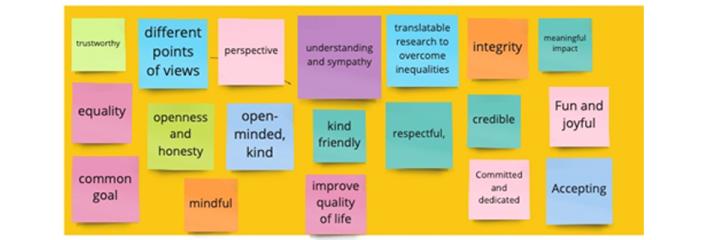
The research team agreed that shared values that were built on integrity, trust, kindness, open mindedness, respect, equality and joyfulness would be essential for the success of the research project. Ways of working that focussed on a commitment to deliver the research project aims to create meaningful impact and social change, would be required and valued within the research team.
Are we compatible as a CBPR team? Do we have any conflicting attitudes, beliefs, or histories that we should identify and discuss?

The research team agreed that the organisations, EPSRC Our Health based at the University of Edinburgh (Gilchrist, 2022) and Versus Arthritis shared positive philanthropic histories and placed great value in research to make the world a better place specifically in terms of improving health for everyone. On an individual level it was acknowledged that the team members represent different cultures, histories, perspectives and experiences, but those differences were deemed to be positive, as they could be used to create new perspectives that could improve the research project.
Will this CBPR project bring about mutual benefit? How will those benefits be shared equally?
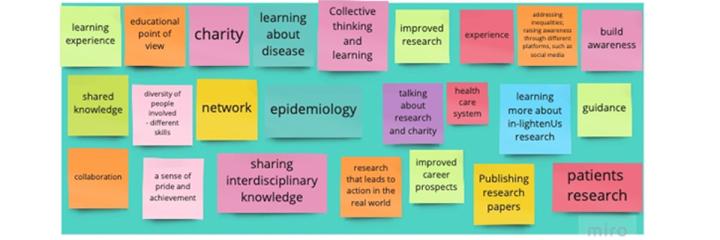
The research team agreed that shared learning (knowledge creation and skill building) would be a key benefit for all participants. Creating social change by empowerment of people living with Arthritis, reducing health inequalities in communities and feeling a sense of pride and achievement in doing so, was also identified as a shared benefit.
The second research aim was to explore in more depth than the previous research workshops had allowed the lived experience of people who have been diagnosed with Arthritis and who have managed the disease over many years. A method regularly used with NHS services known as emotional touch points (ETM) was selected, as a method that would allow the research team to understand the issues that were most important to people living with Arthritis.
The ETM method involves individuals (in this case, the Versus Arthritis research team members) describing how Arthritis affects their health and well-being. The individual firstly selects an experience of Arthritis (my experience) that is particularly powerful for them and then begins a facilitated, verbal expression of that experience. Whilst describing the selected experience (also known as the ‘touchpoint’) the individual selects a number of cards to support their chosen experience. The cards visually express a wide range of emotions. The use of these emotions cards, allows the individual to reflect more fully about the emotional impact of the disease and how that personal impact, can make sense of some of the wider issues around how Arthritis is diagnosed and treated within UK healthcare services.
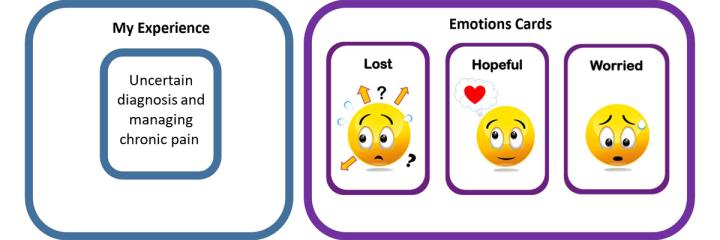
The rich research data documenting the varied experiences of people living with Arthritis that was gathered through a series of emotional touch point workshops was then analysed by thematic analysis, a method routinely used in the field of social sciences. Thematic analysis allowed the research team to draw out the main themes from the data in order to compile them into 3 group stories, losing yourself, a life interrupted by pain and seeking answers.
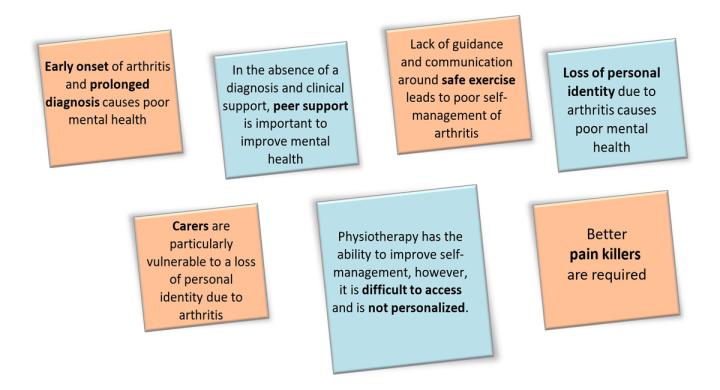
The group stories will be used in Phase 2 of the research project to co-develop research questions that will then be investigated by the next research team, who will create new knowledge about Arthritis. The next research team will involve British undergraduate students from the Cowrie Scholarship Foundation and patients with African and Afro Caribbean heritage, so that we can better understand how the disease affects people from these particular backgrounds.
Find out more about a paid opportunity and joining our team.
If you would like to find out more about our research, comment upon how the stories affected you, or tell your own health story then please email Helen (the research lead) at:
Helen.Szoor-McElhinney@ed.ac.uk
References
Andrews, J, Partnership readiness for community-based participatory research, Health Education Research, Volume 27, Issue 4, August 2012, Pages 555–571, https://doi.org/10.1093/her/cyq050
Gilchrist, L, Willis, A & Szoor-McElhinney, H 2022, 'Our Health: Exploring interdisciplinarity and community based participatory research in a higher education science shop', Research For All, vol. 6, no. 1, 18, pp. 1- 13. https://doi.org/10.14324/RFA.06.1.18
Losing Yourself

A Life Interrupted by Pain
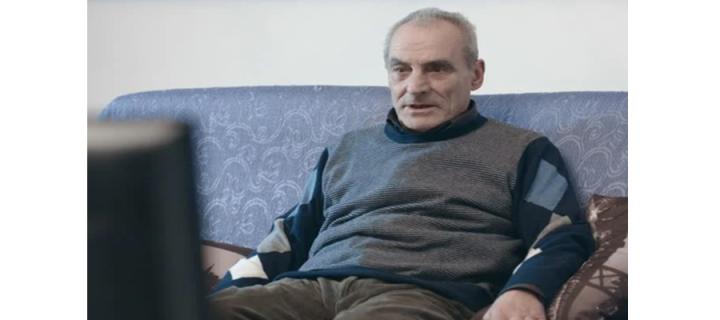
Seeking Answers


